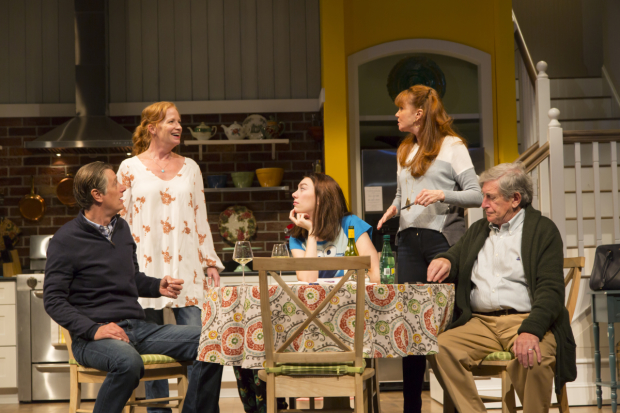Choice

(© T. Charles Erickson)
Winnie Holzman writes about what she knows. In her new play, Choice, now running in its world premiere production at the Huntington Theatre Company under the direction of Sheryl Kaller, she borrows from several of her past successes. One character, Zoe, a directionless young woman, could be straight out of Holzman's television series, My So-Called Life, although Zoe is a recent college graduate, rather than a high school student. She has bunked out in her childhood room, with no plans to move on or move out. And the mysterious cat or feral animal haunting the kitchen of Zoe's mother, Zipporah "Zippy" Zunder, might have escaped from the captivity endured by the animals of Wicked, the musical for which Holzman wrote the book.
Moreover, the plot of this psyche-searching comedy-drama seems like a cut-and-paste job, culled from various films and plays that explore a woman's right to choose and its repercussions. Zippy (the always exemplary Joanna Day) is undergoing a mid-life crisis, compounded by elements of her career as a freelance journalist: her marriage to an older man, Clark Plumly (a sweetly supportive Munson Hicks), who has begun to show his age; the inaction of her daughter (the smart-mouthed Madeline Wise); and the disloyalty of her best friend, Erica (a brittle Connie Ray). Then there's the scratching in her kitchen by night, from the unexplained and frightening presence of an unseen being.
Zippy is writing an interview for Vanity Fair about a film producer, Stephanie Beechum, who believes in the reincarnation of aborted fetuses that come to life as children in the future. She has found a young woman whom she thinks is the daughter that never was and is sending her to college. Although Zippy intended the piece to be a hatchet job, she begins to have her doubts because she, too, had an abortion 25 years ago. Her newly hired assistant, Hunter Rush (an eerie and manipulative Raviv Ullman), is the right age and seems amazingly in tune with Zippy's needs.
Day gives Zippy an empathy that allows her to connect with the actors around her, a combination of understanding and exasperation with her daughter, concern for her husband, and bewilderment at the collapse of the support she expected from Erica. Ullman plays Rush as Johnny-on-the-spot, too eager and too available to hide his ulterior motives. But the laurels for a breakout performance goes to Wise as the annoyingly self-absorbed daughter, transformed into the savvy new-found child, Lena, and finally, the solicitous nurse in Zippy's fantasy scene.
One problem with the play is that the woman whom Zippy is interviewing never appears onstage, although she is the subject of much talk. Another misfire is that the celeb's supposedly reborn daughter, in the person of the Russian immigrant, Lena, complete with a thick accent and attitude to match, is introduced in an extraneous scene with Zippy. Wise brings the beautician, Lena, to amusing life but the scene does little more than make fun of the women who obsessively wax their bodies. Inexplicably, the same scene reverts to a flashback by projecting Zippy back to the site of her abortion, and turning Zoe-Lena into the nurse who attended her.
Another subplot that does little to advance the theme other than to deliver some exposition comes at the opening to Act 2 when Zippy and Erica have a lunch-date with Zippy's long-lost lover, Mark (the affable Ken Cheeseman who also plays Erica's boyfriend in Act 1). It seems that Mark has had a stroke, which renders him impaired in various ways. Holzman turns his tics into one-liners but there's little funny about the aftereffects of an illness.
Luckily, for Holzman, the Huntington has given the new work a bang-up production, complete with this excellent cast and first-class stage design by James Noone, with lighting design by Rui Rita. The setting provides a trendy, chic, suburban home, that reveals other locations as pop-ups when needed, like one of those Advent calendars that hides holiday delights behind little doors.
Somewhere, beneath all the verbiage and confrontations, lies Holzman's theme about a woman's right to choose, coupled with a warning about future consequences. As Holzman writes in a program note, "the past is never completely new," arguably a theme that's been explored in more memorable ways by other playwrights and might, at this point, be beyond its theatrical shelf life, at least for this outing.










